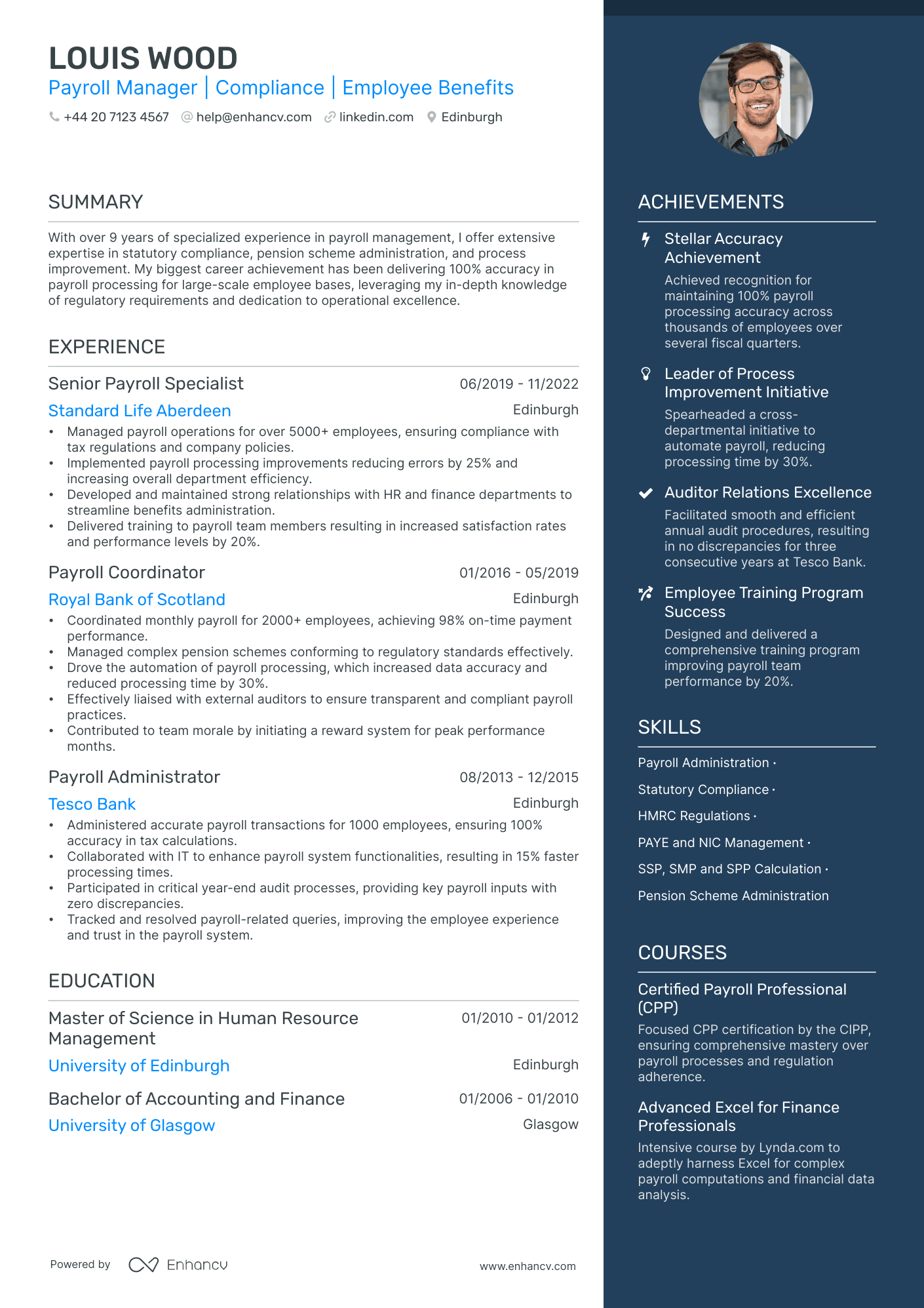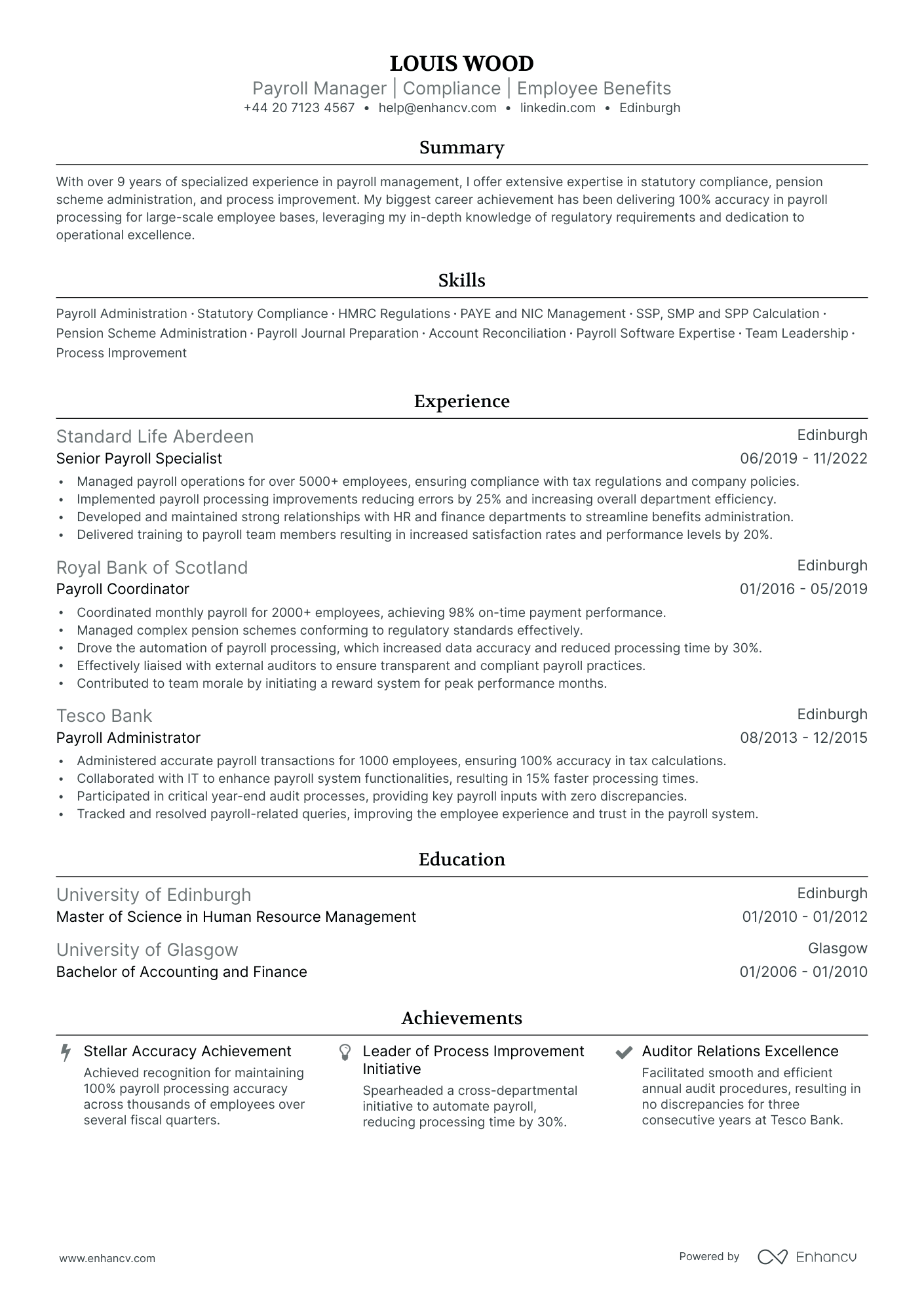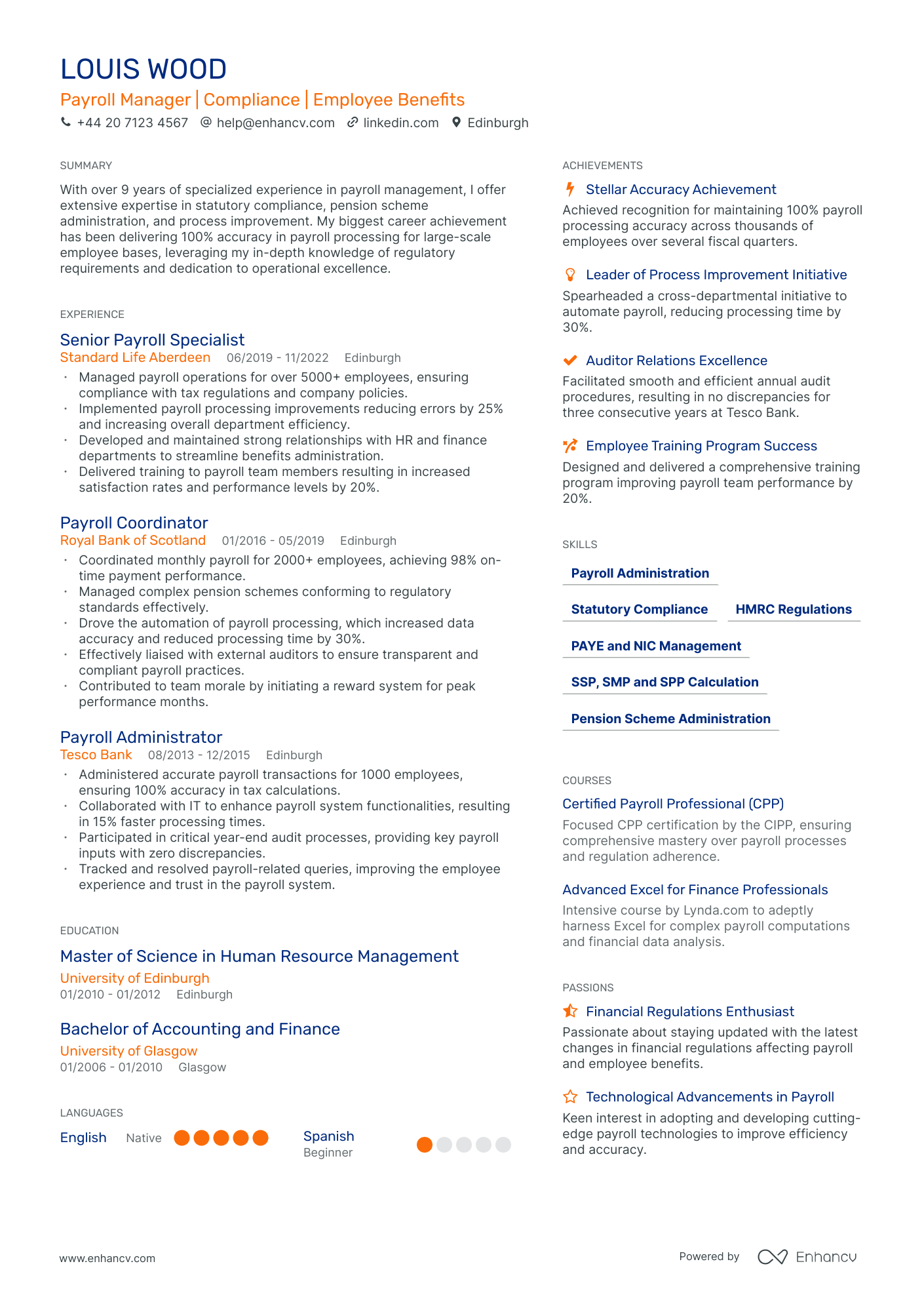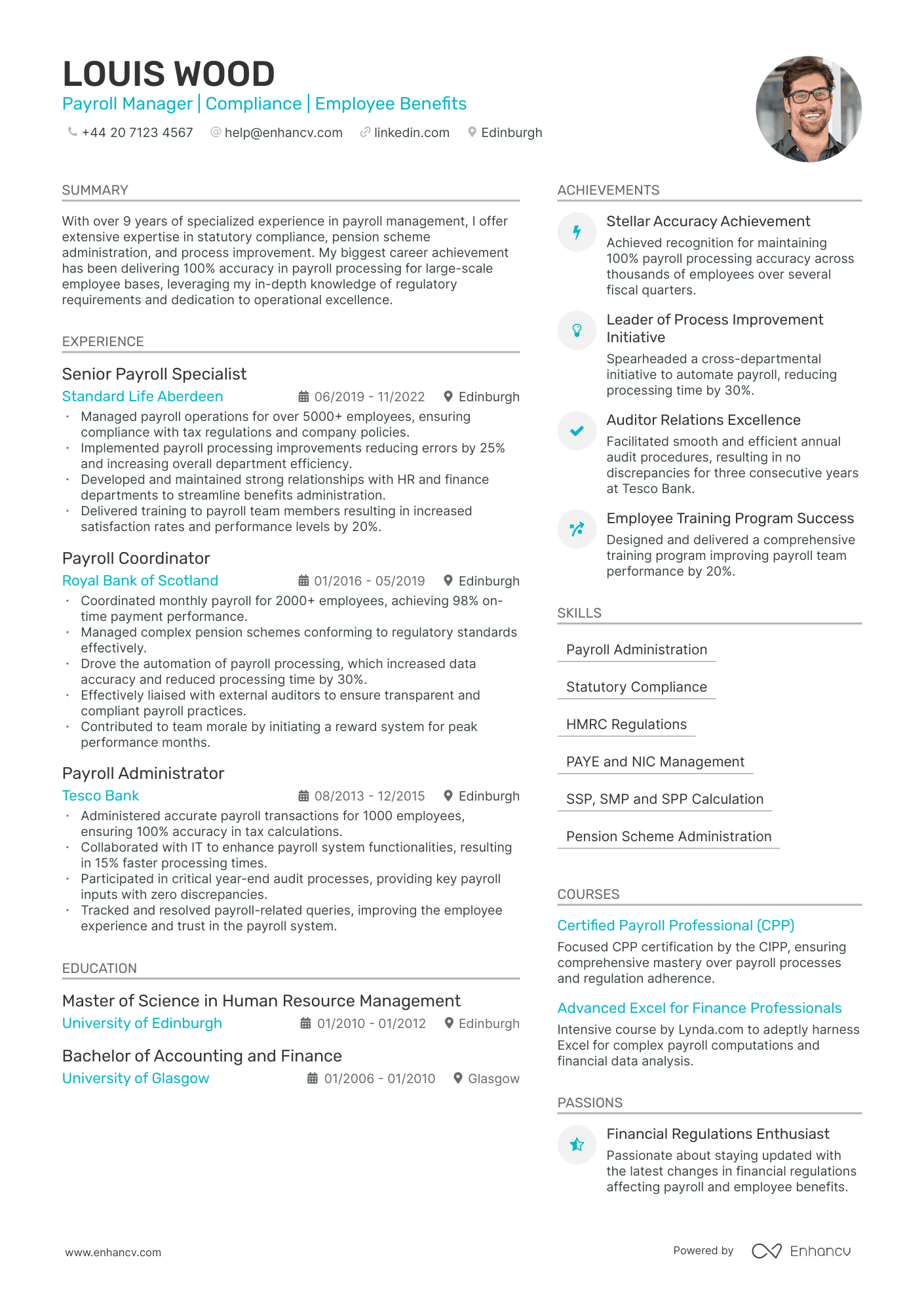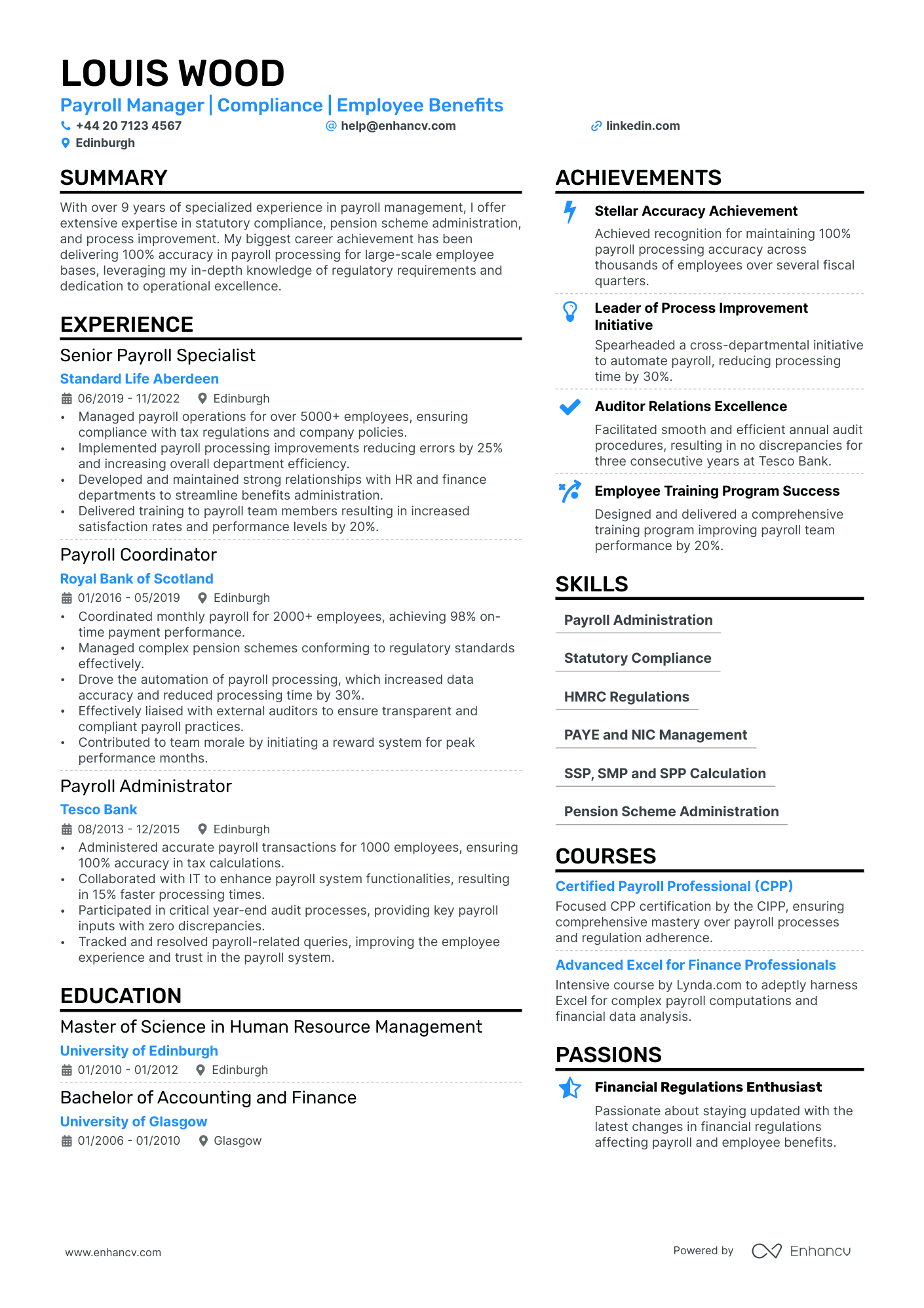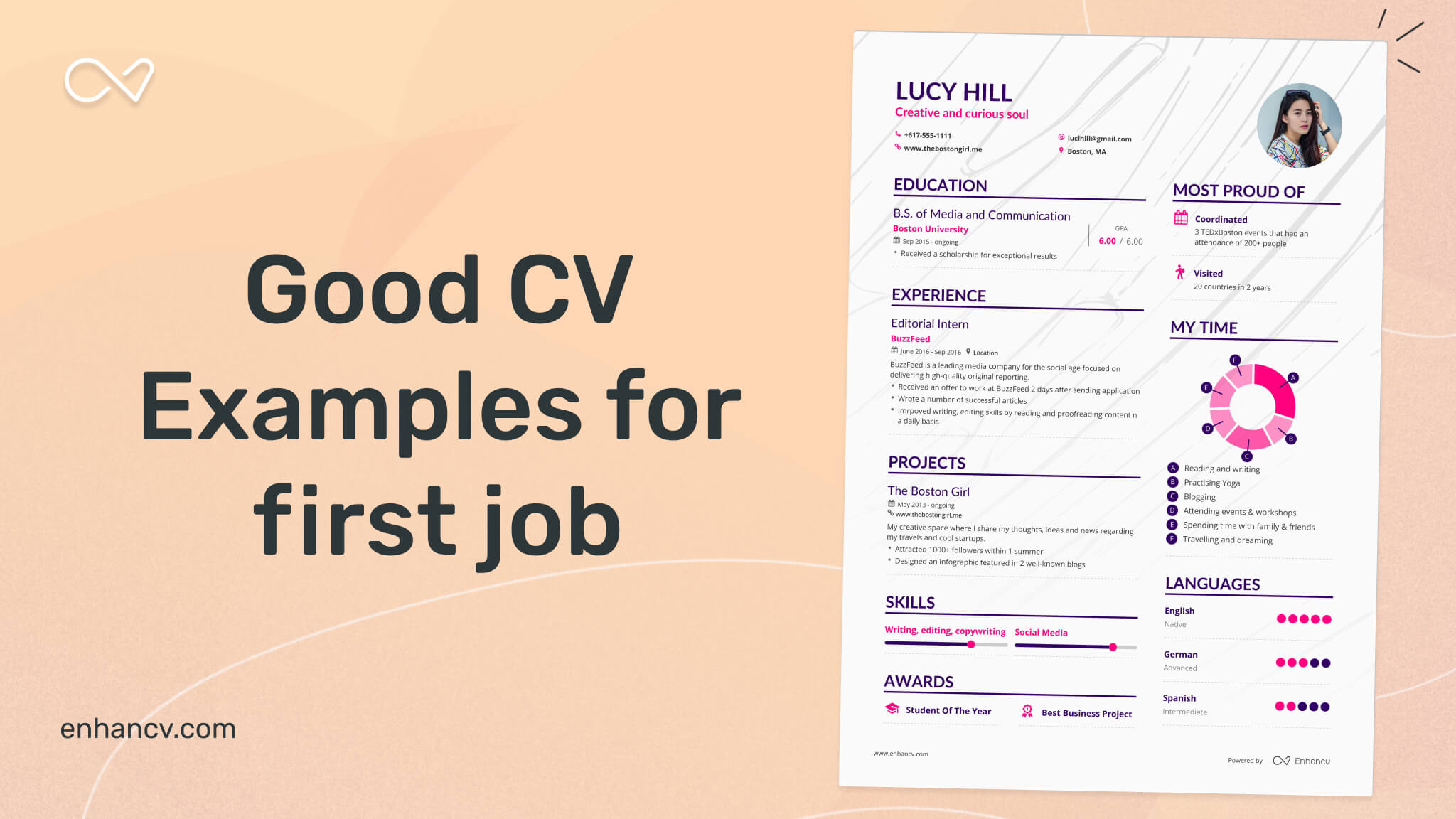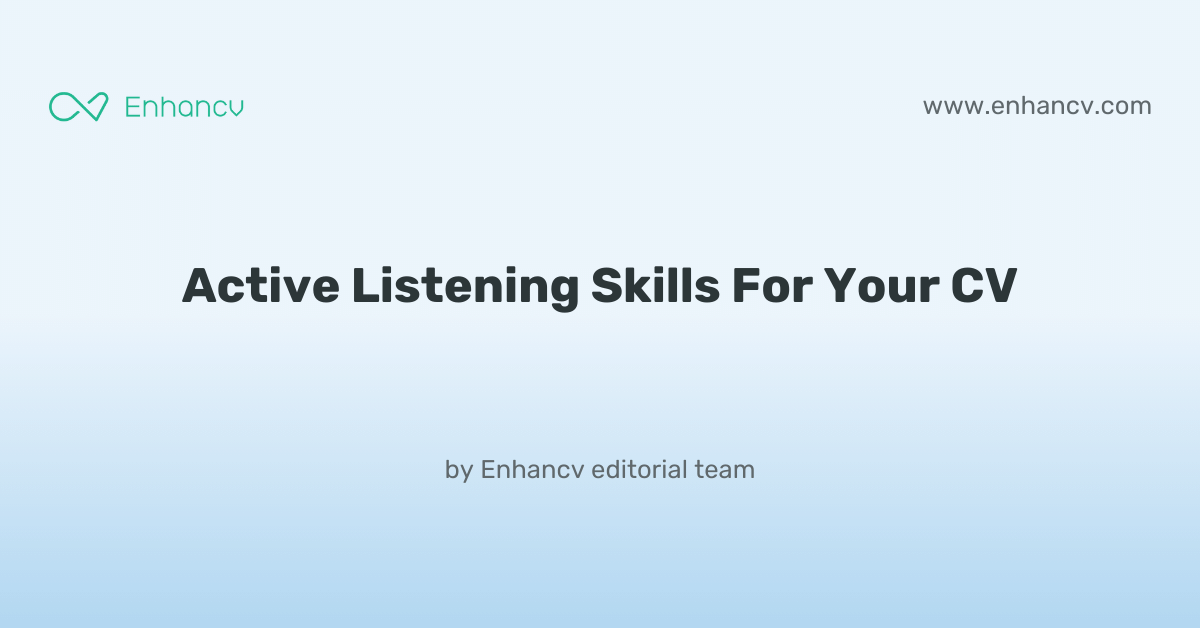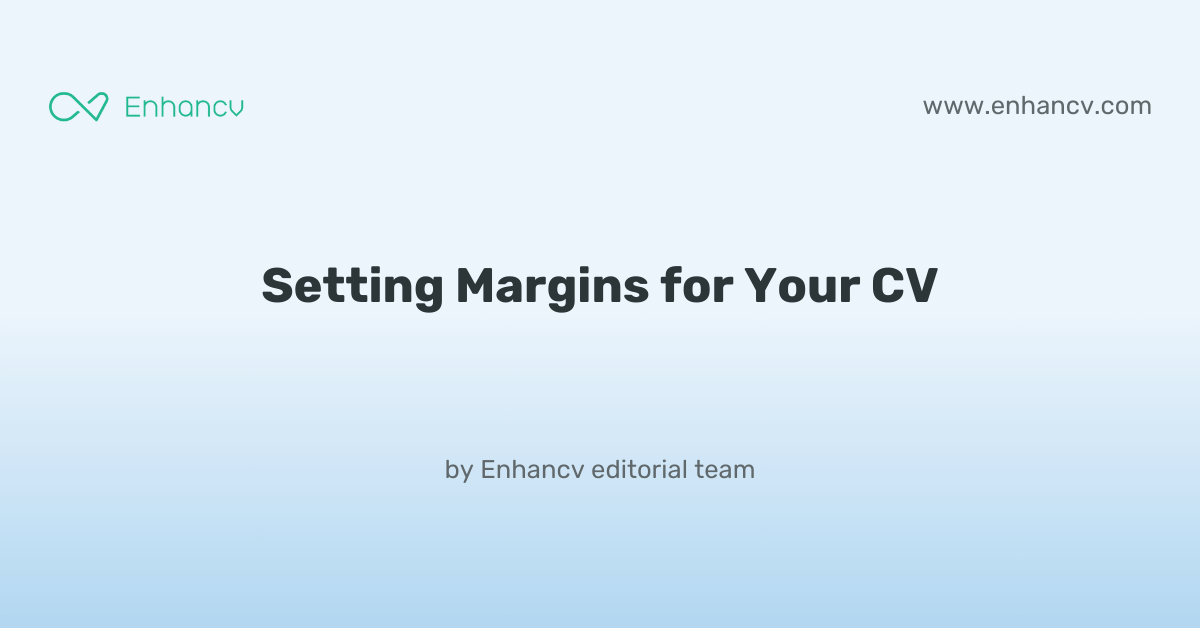One CV challenge you might encounter as a payroll manager is effectively showcasing your ability to navigate complex tax regulations and compliance issues. Our guide offers detailed tips on how to highlight your expertise in these areas, ensuring your CV stands out to prospective employers.
- Applying the simplest CV design, so that recruiters can easily understand your expertise, skills, and professional background;
- Ensuring you stand out with your header, summary or objective statement, and a designated skills section;
- Creating your CV experience section - no matter how much expertise you have;
- Using real life professional CV examples to enhance the structure and outline of your profile.
If you still have no muse to write your professional CV, find some more industry-leading examples.
Structuring and formatting your payroll manager CV for an excellent first impression
The experts' best advice regarding your CV format is to keep it simple and concise. Recruiters assessing your CV are foremost looking out for candidates who match their ideal job profile. Your white space, borders, and margins. You may still be wondering which format you need to export your CV in. We recommend using the PDF one, as, upon being uploaded, it never alters your information or CV design. Before we move on to the actual content of your payroll manager CV, we'd like to remind you about the Applicant Tracker System (or the ATS). The ATS is a software that is sometimes used to initially assess your profile. Here's what you need to keep in mind about the ATS:- All serif and sans-serif fonts (e.g. Rubik, Volkhov, Exo 2 etc.) are ATS-friendly;
- Many candidates invest in Arial and Times New Roman, so avoid these fonts if you want your application to stand out;
- Both single and double column CVs can be read by the ATS, so it's entirely up to you to select your CV design.
PRO TIP
Be mindful of white space; too much can make the CV look sparse, too little can make it look cluttered. Strive for a balance that makes the document easy on the eyes.
The top sections on a payroll manager CV
- Professional Summary to showcase expertise: This provides a concise overview of the candidate's key qualifications and unique value they bring to the payroll function.
- Key Payroll Skills to highlight strengths: Focused on specific payroll skills, this demonstrates the individual's ability to manage complex payroll systems and compliance with legislation.
- Payroll Management Experience for trust: Shows a track record of success in managing payroll, highlighting the ability to handle sensitive information and complex calculations.
- Certifications in Payroll Management for credibility: Lists relevant industry certifications which demonstrate a commitment to professional development and expertise in payroll.
- Achievements in Payroll Projects for impact: This section highlights major accomplishments, cost savings, or process improvements led by the candidate in a payroll context.
What recruiters value on your CV:
- Highlight your proficiency with payroll software and systems, detailing your experience with specific platforms such as Sage, QuickBooks, or ADP, and mention any certifications you have obtained.
- Emphasize your understanding of payroll legislation, tax requirements, and compliance, showcasing your ability to stay updated with the latest changes and apply them effectively within the company.
- Demonstrate your leadership skills by mentioning any previous roles where you managed a payroll team, including the size of the team and the volume of the payroll processed.
- Outline your analytical skills by providing examples of how you’ve successfully managed payroll budgets, conducted audits, or implemented cost-saving measures in your past roles.
- Illustrate your attention to detail and accuracy with specific examples of error-free payroll processing, emphasizing the importance you place on data privacy and careful record-keeping.
Recommended reads:
Making a good first impression with your payroll manager CV header
Your typical CV header consists of Your typical CV header consists of contact details and a headline. Make sure to list your professional phone number, email address, and a link to your professional portfolio (or, alternatively, your LinkedIn profile). When writing your CV headline , ensure it's:
- tailored to the job you're applying for;
- highlights your unique value as a professional;
- concise, yet matches relevant job ad keywords.
You can, for examples, list your current job title or a particular skill as part of your headline. Now, if you decide on including your photo in your CV header, ensure it's a professional one, rather than one from your graduation or night out. You may happen to have plenty more questions on how to make best the use of your CV headline. We'll help you with some real-world examples, below.
Examples of good CV headlines for payroll manager:
- Payroll Manager | Chartered CIPP | Strategic Compliance Oversight | 8+ Years’ Experience
- Senior Payroll Specialist | Global Payroll Integration | CertRP Qualified | 10 Years in Industry
- Payroll Lead | Expert in HMRC Regulations | Systems Implementation | 12 Years’ Expertise
- Deputy Payroll Manager | Payroll Software Solutions | ACCA Member | 5+ Years Progressive Experience
- Head of Payroll | Employee Benefits Management | Payroll Transformation | 15 Years Senior-Level Practice
- Payroll Supervisor | MSc in HR & Payroll Management | In-House & Outsourced Payroll | 7 Years’ Tenure
Opting between a payroll manager CV summary or objective
Within the top one third of your payroll manager CV, you have the opportunity to briefly summarise your best achievements or present your professional goals and dreams. Those two functions are met by either the CV summary or the objective.
- The summary is three-to-five sentences long and should narrate your best successes, while answering key requirements for the role. Select up to three skills which you can feature in your summary. Always aim to present what the actual outcomes were of using your particular skill set. The summary is an excellent choice for more experienced professionals.
- The objective is more focused on showcasing your unique value as a candidate and defining your dreams and ambitions. Think about highlighting how this current opportunity would answer your career vision. Also, about how you could help your potential employers grow. The objective matches the needs of less experienced candidates, who need to prove their skill set and, in particular, their soft skills.
Still not sure about how to write your CV opening statement? Use some best industry examples as inspiration:
CV summaries for a payroll manager job:
More detailed look into your work history: best advice on writing your payroll manager CV experience section
The CV experience is a space not just to merely list your past roles and responsibilities. It is the CV real estate within which you could detail your greatest accomplishments and skills, while matching the job requirements. Here's what to have in your experience section:
- Prove you have what the job wants with your unique skill set and past successes;
- Start each bullet with a strong, action verb, and continue with the outcome of your responsibility;
- Use any awards, nominations, and recognitions you've received as solid proof of your skill set and expertise;
- align your experience with the role responsibilities and duties.
For more help on how to write your CV experience section, check out the next section of our guide:
Best practices for your CV's work experience section
- Managed a team of payroll specialists, ensuring accurate and timely processing of payroll for over 2,000 employees across multiple regions, whilst adhering to company policies and compliance with relevant legislation.
- Implemented a new payroll system that increased processing efficiency by 20%, involving the migration of historical data and training of staff to enhance proficiency in the new software.
- Conducted regular audits of payroll procedures to identify and rectify discrepancies, maintaining an error rate of less than 0.5%, thereby upholding the integrity of payroll operations.
- Collaborated with HR and finance departments to align payroll processes with employee benefits, tax planning, and budget forecasts, ensuring a cohesive financial management strategy.
- Liaised with external auditors and provided documentation as required, contributing to the successful completion of financial audits without any payroll-related qualifications.
- Developed and maintained a robust understanding of HM Revenue & Customs (HMRC) regulations, enabling the company to remain compliant with UK payroll legislation and statutory requirements.
- Facilitated employee understanding of payroll processes through the creation and delivery of clear, concise communication materials and training sessions, resulting in a 40% reduction in payroll-related queries.
- Negotiated contracts with payroll software suppliers and managed vendor relationships to ensure the company received optimal service and value for money from payroll-related products and services.
- Played a pivotal role in the transition to a paperless payroll system, enhancing data security and contributing to the company's environmental sustainability goals.
- Supervised a payroll department of 10 staff for a multinational corporation, ensuring accurate salary disbursements to over 5,000 employees across 4 continents
- Implemented a new payroll system that reduced processing time by 25% and increased overall efficiency
- Led a project team in the integration of payroll with human resources management systems, enhancing data consistency and security
- Oversaw payroll compliance for a leading financial firm, maintaining adherence to changing tax laws across multiple jurisdictions
- Initiated a payroll-specific training program that decreased payroll-related enquiries to the HR department by 40%
- Directed the successful migration of payroll data during a major company merger, affecting over 10,000 employees
- Managed day-to-day payroll operations in a high-volume retail business, processing wages for over 3,000 staff members weekly
- Redesigned payroll workflows to include best practice checks, reducing errors by 30% within the first year
- Fostered strong relationships with the retail management team to ensure smooth onboarding for seasonal staff fluctuations
- Administered payroll for a leading insurance company, consistently meeting weekly deadlines and maintaining a 99.8% accuracy rate
- Liaised with accounting and finance departments to streamline expense reimbursement, saving the company an average of £10,000 per month
- Contributed to the development of a bespoke payroll software tailored to the company's unique needs
- Managed the end-to-end payroll process for a healthcare provider, serving over 2,500 employees and ensuring accurate statutory deductions
- Coordinated with IT to introduce biometric attendance systems, leading to a direct reduction in payroll discrepancies
- Cultivated a team culture focused on continual learning, which improved departmental productivity by 15%
- Accountable for the precise execution of the monthly payroll for an international IT services company, impacting over 4,500 employees
- Selected and managed a payroll service provider transition which enhanced data reporting capabilities resulting in improved strategic decision making
- Set up and managed a self-service payroll portal that enhanced employee engagement and reduced manual HR interventions by 50%
- Led a strategic overhaul of payroll systems for an education institution, aligning them with up-to-date compliance standards and reducing processing errors by 20%
- Coordinated cross-departmental efforts to tackle payroll complexities due to academic seasonal work patterns, ensuring on-time payments throughout the year
- Enhanced employee financial well-being by introducing a series of payroll-linked savings and investment programs
- Unified payroll processes after a global merger, standardizing procedures for 8,000 staff in 12 different countries, while ensuring local compliance
- Analyzed and reported on payroll expenses on a quarterly basis to the CFO, aiding in cost reduction strategies that saved the company upwards of £500,000 annually
- Championed a sustainability initiative within the payroll department, moving to paperless pay slips and saving approximately £5,000 per year in material costs
How to ensure your payroll manager CV stands out when you have no experience
This part of our step-by-step guide will help you substitute your experience section by helping you spotlight your skill set. First off, your ability to land your first job will depend on the time you take to assess precisely how you match the job requirements. Whether that's via your relevant education and courses, skill set, or any potential extracurricular activities. Next:
- Systematise your CV so that it spotlights your most relevant experience (whether that's your education or volunteer work) towards the top;
- Focus recruiters' attention to your transferrable skill set and in particular how your personality would be the perfect fit for the role;
- Consider how your current background has helped you build your technological understanding - whether you've created projects in your free time or as part of your uni degree;
- Ensure you've expanded on your teamwork capabilities with any relevant internships, part-time roles, or projects you've participated in the past.
Recommended reads:
PRO TIP
Talk about any positive changes you helped bring about in your previous jobs, like improving a process or helping increase efficiency.
Describing your unique skill set using both hard skills and soft skills
Your payroll manager CV provides you with the perfect opportunity to spotlight your talents, and at the same time - to pass any form of assessment. Focusing on your skill set across different CV sections is the way to go, as this would provide you with an opportunity to quantify your achievements and successes. There's one common, very simple mistake, which candidates tend to make at this stage. Short on time, they tend to hurry and mess up the spelling of some of the key technologies, skills, and keywords. Copy and paste the particular skill directly from the job requirement to your CV to pass the Applicant Tracker System (ATS) assessment. Now, your CV skills are divided into:
- Technical or hard skills, describing your comfort level with technologies (software and hardware). List your aptitude by curating your certifications, on the work success in the experience section, and technical projects. Use the dedicated skills section to provide recruiters with up to twelve technologies, that match the job requirements, and you're capable of using.
- People or soft skills provide you with an excellent background to communicate, work within a team, solve problems. Don't just copy-paste that you're a "leader" or excel at "analysis". Instead, provide tangible metrics that define your success inusing the particular skill within the strengths, achievements, summary/ objective sections.
Top skills for your payroll manager CV:
Payroll Processing
Knowledge of Tax Regulations
Accounting Principles
Financial Reporting
Attention to Detail
HRIS Systems Proficiency
Data Analysis
Compliance Management
Benefits Administration
Advanced Excel Skills
Leadership
Communication
Organisational Skills
Problem Solving
Analytical Thinking
Time Management
Confidentiality
Empathy
Teamwork
Decision Making
PRO TIP
Focus on describing skills in the context of the outcomes they’ve helped you achieve, linking them directly to tangible results or successes in your career.
CV education and certificates: your academic background as proof of your skill set
A common misconception about your payroll manager CV education is that you only need it, if you have less professional experience. That is completely false. The CV education section serves to back up your technical (and sometimes personal) capabilities, fill in gaps in your work history, and show you have the initial industry background and know-how. When creating your education section:
- List your degrees in the reverse chronological order, starting with the most recent (and relevant) ones first;
- Include your degree and university names, start and graduation dates. It's optional to also denote you received a "First-Class Honours" for diplomas that are more relevant to the role;
- Curate your relevant university coursework, projects, or thesis work if you happen to have less professional expertise and need to integrate more job keywords and skills.
Your professional qualifications don't need to stop at your academic background. It's advisable to also select up to three of your most noteworthy (and relevant) industry certificates and feature them in a dedicated section. Once more, include the certificate name, the institution that issued it out, and the date you obtained it on. You could feature both hard skills and soft skills certificates, as in the examples below:
PRO TIP
Order your skills based on the relevance to the role you're applying for, ensuring the most pertinent skills catch the employer's attention first.
Recommended reads:
Key takeaways
Write your professional payroll manager CV by studying and understanding what the role expectations are. You should next:
- Focus on tailoring your content to answer specific requirements by integrating advert keywords through various CV sections;
- Balance your technical know-how with your personal skills to showcase what the unique value would be of working with you;
- Ensure your CV grammar and spelling (especially of your key information and contact details) is correct;
- Write a CV summary, if your experience is relevant, and an objective, if your career ambitions are more impressive;
- Use active language by including strong, action verbs across your experience, summary/objective, achievements sections.
